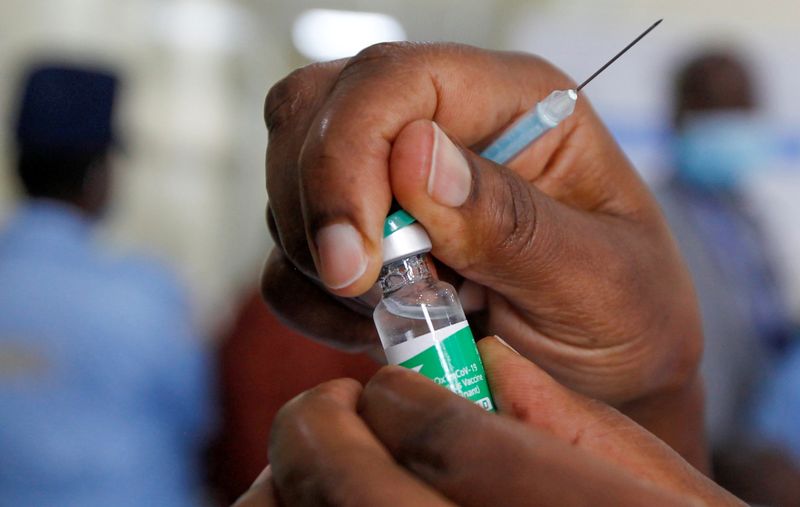By John Miller
ZURICH (Reuters) - A World Trade Organization (WTO) council is meeting this week to discuss a proposal by India and South Africa that COVID-19 vaccine patents be suspended to speed up technology transfers to manufacturers with spare production capacity.
The idea seems simple, but some experts say it's not so clear cut. Below we lay out the reasons.
WHAT'S BEING DISCUSSED?
In October, India and South Africa proposed suspending provisions of the WTO's Agreement on Trade-Related Aspects of Intellectual Property (IP) Rights, or TRIPS, contending they hinder the COVID-19 fight and curb access to drugs.
Some 100 nations have expressed support, as has Doctors Without Borders (MSF) and World Health Organization head Tedros Adhanom Ghebreyesus.
"If a temporary waiver to patents cannot be issued now, during these unprecedented times," he said, "when will be the right time?"
MSF has said countries could immediately scale up production, speeding deliveries to poorer nations that just now, via the COVAX vaccine sharing scheme led by the GAVI vaccines alliance, are getting shots after wealthier nations were first in line.
The WTO's TRIPS Council, designed to monitor and resolve IP issues, is expected to address the proposal at meetings on Wednesday or Thursday.
WHY IS IT AN ISSUE NOW?
It has gained more support and attention as concerns grow about getting shots to the world's poorest people while shortages of supplies are hampering rollouts in even the wealthiest regions of the world.
A report by anti-poverty campaigners published last month said that rich countries have secured more than a billion more doses than they need, highlighting the divide between rich and poor.
WHO'S AGAINST IT?
Big drug companies oppose patent waivers, with the Pharmaceutical Research and Manufacturers of America, or PhRMA, saying there is no evidence it would boost vaccine production or access. It said in a letter to U.S. President Joe Biden on March 5 that eliminating protections would undermine the global response to the pandemic, including efforts to tackle new variants, create confusion that could hurt public confidence in vaccine safety and create a barrier to information sharing.
"The proposal marks a significant escalation in anti-IP global activism and will further polarize legitimate conversations on countries' engagement to combat the pandemic," PhRMA said.
Britain, Switzerland and the United States, home to big pharmaceutical industries, dislike it too.
Industry contends that appropriate patent protections ensure that private investors have an incentive to pump money into research and development.
IS THERE A PRECEDENT FOR THIS?
Two decades ago, Mozambique, Zambia and Zimbabwe issued compulsory licences for HIV/AIDS drugs, followed by Indonesia, Malaysia and Brazil, which meant that governments were allowed to waive IP rights without the licence owners' consent.
These moves, after talks with drugmakers failed, drastically cut AIDS drug costs and boosted access.
Advocates including South Africa and India hope their current waiver push reaps similar results, contending "unhindered global sharing of technology and know-how" will expand the COVID-19 response to neglected areas.
IS THERE A CASE OR A NEED FOR IT NOW?
Big Pharma, and even some groups pushing to accelerate COVID-19 vaccine deliveries to developing nations, say vaccine-making is difficult, so suspending patents alone won't bring more shots.
The Developing Countries Vaccine Manufacturers Network (DCVMN), which pushes for more manufacturing in poorer nations, agrees giving away IP for the pandemic's duration is not the answer.
Unlike the simpler-to-make AIDS drugs of two decades ago, complex vaccines require deep cooperation between developers and manufacturers, DCVMN President Sai Prasad said.
"It's not a single, monolithic IP that can manufacture these products," said Prasad, also an executive at Indian vaccine maker Bharat Biotech.
Oxford University's Sarah Gilbert, who partnered with AstraZeneca (NASDAQ:AZN) on its vaccine, told British lawmakers much the same.
"I really want to get rid of the idea that we should just be sharing the IP and let everybody make their own vaccines," Gilbert said.
Vaccine makers are already cooperating, too, with Novartis, Merck and Sanofi (PA:SASY) pitching in to help numerous vaccine makers with manufacturing and fill-and-finish capacity.
Richard Hatchett, who leads the Coalition for Epidemic Preparedness Innovations (CEPI), an alliance promoting vaccine development, said this week IP barriers were "not an acute problem", and that bottlenecks like raw material shortages were a bigger concern.
WHAT MIGHT BE THE OUTCOME OF THIS WEEK'S MEETINGS?
Newly installed WTO head Ngozi Okonjo-Iweala has hinted at a compromise, what she called a "third way", to broaden patent sharing within the existing framework of multilateral rules to speed the COVID-19 response.
She said in a speech on Tuesday that the TRIPS Council discussions were vitally important, but "the fact is that each additional day the vaccine shortage continues, people will pay with their lives".

Her idea has won support from the U.S. Chamber of Commerce, an influential U.S. business lobby.